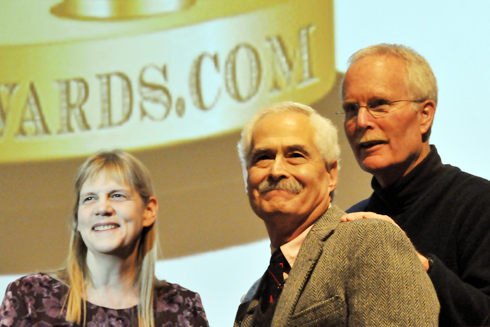College of Social Studies Celebrates 50 years at Wesleyan

From its beginnings in 1959, Wesleyan’s College of Social Studies (CSS) has grown into a well-respected program and is celebrating its 50th year in 2009. The multidisciplinary program allows students to explore the subjects of government, history, economics and philosophy concurrently. Many attended lectures and celebrations for CSS during Homecoming/Family Weekend last weekend.
The first event of the weekend was a CSS Public Lecture by John Goldberg (CSS 1983, professor of Law, Harvard Law School) on Friday, Nov. 6. His talk was titled “John Locke on Tort Reform (Really!): A CSS Parable.” John Goldberg was introduced by Brian Fay, the William Griffin professor of philosophy. Richard Adelstein, professor of economics, gave the response.
Peter Kilby, professor of economics, emeritus, chaired a CSS Alum Speaker Panel on CSS Entrepreneurs on Saturday, Nov. 7. The panelists included Steve Torok ’73, Donald Zilkha ’73, Lincoln Frank ’79, and Jonathan Bush ’93. A second Alum Speaker Panel, on International Affairs, was chaired by Andrew Crawford ’97, and included panelists Bob Hunter ’62, John Stremlau ’66, Carl Robichaud ’99 and Michael Brotchner ’95.
“What impressed me the most was the way in which speaker after speaker mentioned, with specific examples, how the method of study in the CSS continued to profoundly shape the way they handled their jobs in their subsequent career, whether it be a public defender or a venture capitalist,” said Peter Rutland, Colin and Nancy Campbell Professor in Global Issues and Democratic Thought and CSS Co-Chair, who attended the event.
“Skills such as being able to write quickly and clearly; and to see many sides of a problem, and integrate them in a single analysis served CSS students well after graduation,” he recounts.
Along with Fay, Adelstein, Kilby (who retired last year), and Rutland, core professors in the CSS within the past 20 years include Cecilia Miller, associate professor of history and CSS Co-Chair; Bill Barber, Andrews Professor of Economics, Emeritus; the late David Titus, professor of government, Emeritus; David Morgan, professor of history, Emeritus; Don Moon, Ezra and Cecile Zilkha Professor in the College of Social Studies and professor of government; Nancy Schwartz, professor of government; Giulio Gallarotti, professor of government; Gil Skillman, chair and professor of economics; Joyce Jacobsen, Andrews Professor of Economics; and Erik Grimmer-Solem, associate professor of history and director of the Public Affairs Center.
According to the program description, the College of Social Studies “was created in the belief that the various social studies can best be pursed together, rather than in isolation, and that the student will better understand the subject matter and the nature of each discipline by considering it in its relation to the other disciplines, and to develop a sense of methodological criticism supported by work in philosophy.”
Former Wesleyan President Victor Butterfield crafted the plan for the CSS along with the College of Letters (also celebrating 50 years) and the College of Quantitative Studies, which disbanded in the 1960’s. Butterfield believed strongly in the importance of interdisciplinary studies.
“The curriculum stresses fundamental techniques of analysis in economics, history, and government, as well as their application in the subject matter of those fields. Precision in writing and speaking is stressed in essays and class work. A number of lectures and seminars provide a sense of community that balances the educational aspect of the College,” the program description states.
Throughout the years, CSS has produced more than 930 graduates including John Driscoll, who currently works as the University Relations Alumni Director. Driscoll graduated from Wesleyan in class of 1962 and was a member of the very first CSS class.
“In the beginning the CSS was the unstructured part of Wesleyan,” Driscoll says. “The ‘normal’ parts of Wesleyan were filled with requirements, grades, and regular tests. That may seem odd today, but then we were looked on with a mixture of curiosity, envy and resentment because while others were sweating through the regular grind, we weren’t. At least not in the same way. We were “free” of the superficial preoccupation with grades; we could focus on learning for its own sake. And for us the ability to focus on one tutorial for ten weeks along with a colloquium on epistemology each week was true liberation.”
CSS graduates have gone on to excel in a range of fields, including government service, law, business, the arts and even medicine. CSS graduates have also been well represented on the Wesleyan Board of Trustees, and in recent years the Board has included four or more CSS alumni.

